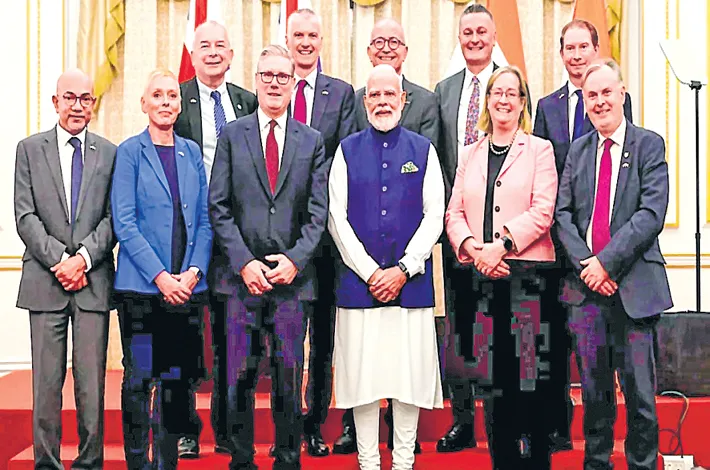9 UK Universities to Open New Campuses in India
14-10-2025 12:00:00 AM

Higher Education Sector Set to Flourish
The UK is set to become the country with the biggest higher education footprint in India--in a major boost for the UK’s reputation abroad. The country’s world-renowned higher education sector will offer thousands of Indian students the chance to study for a UK degree without leaving home.
Simple Vishwakarma Mumbai
In a major boost to India–UK educational ties, Prime Minister Narendra Modi announced on October 10, 2025, that nine universities from the United Kingdom will soon open campuses in India. The announcement was made during UK Prime Minister Keir Starmer’s visit, which Modi said, signals a renewed momentum in bilateral relations following the recent Free Trade Agreement (FTA).
PM Modi highlighted the work made thus far, stating that the University of Southampton's Gurugram campus has already opened and that the first class of students has registered. PM Modi referred to the delegation that accompanied PM Starmer as the biggest and most powerful from the education industry to date, saying, “It is a matter of great joy that nine UK universities are now going to establish campuses in India.”
List of UK Universities Opening Campuses:
- University of Southampton – Gurugram (already operational)
- University of Liverpool – Bangalore
- University of York – Mumbai
- University of Aberdeen – Mumbai
- University of Bristol – Mumbai
In Gujarat's GIFT City, Prime Minister Modi disclosed that three new campuses are being prepared, extending the UK's academic presence in India's quickly developing educational centre.
PM Starmer affirmed that permission to establish new campuses in India had been given to the Universities of Lancaster and Surrey. “There is a huge demand for the highest calibre of higher education,” Starmer stated. "I am extremely happy to announce that more British universities will be opening campuses in India, completing our Vision 2035 and positioning Britain as India's top international provider of higher education."
“I was honoured to be invited to join the Prime Minister on his visit to India to celebrate the enormous potential for UK higher education to partner and collaborate in India to drive international skills development and research to solve global challenges," said Professor Stephen Jarvis, President and Vice-Chancellor of the University of Surrey, in a statement.
We are thrilled to have received an invitation to join the UK Universities in India Alliance as founding members as we prepare to open our new campus in GIFT City. Surrey is happy to be standing side by side with our partner institutions, offering our own distinct brand of meaningful education. Education is a hugely important export industry for the UK.
Professor Simon Guy, Lancaster University's Pro-Vice-Chancellor Global, added, "Lancaster has always believed in the power of education to transform lives." By establishing a branch campus in Bengaluru, a thriving centre of education, technology, and business, Lancaster University hopes to collaborate with Indian companies, industry, and regional universities to jointly spur growth, create opportunities, and, most importantly, make sure that Lancaster University students worldwide are equipped to thrive and positively impact India and the world.
Currently, India has around 40 million students in universities, but the number is projected to rise to 70 million by 2035. British universities are stepping in to help bridge this gap, offering Indian students the opportunity to pursue UK degrees without leaving the country.
“The UK’s world-renowned higher education sector is capitalising on that demand,” Starmer added. “This will enable thousands of Indian students to access top-notch British education as well as create jobs and spur our economy at home.”
However, the announcement has drawn a mix of excitement and skepticism among Indian students online.
“If UK universities open campuses in India, you’re still in India, same job market, same exposure. Most students go abroad for the experience, not just the degree,” said Kranti Mahesh, a bachelor’s student from Mumbai University, questioning whether the move would truly replicate the international environment of studying overseas.
Another student commented, “They’ll probably charge UK-level fees but offer Indian-level facilities.” Several students echoed similar doubts, expressing concern about affordability and whether the academic quality would match that of the main UK campuses.
Some students also described the move as profit-driven rather than student-focused. “Foreign universities setting up in India is just another business deal. Unless there’s proper regulation, this will only benefit the rich,” said Anand (name changed).
At the same time, others have adopted a more measured or positive outlook. “It’s definitely a big step for Indian higher education, but I’d like to wait and see how these campuses actually function, who’s teaching, what the fee structure is, and whether degrees will hold the same value as in the UK,” said Priya N, a postgraduate aspirant from Bengaluru.
“This is a great move! Not everyone can afford to go abroad, so having UK universities here will give many of us access to global education at a fraction of the cost,” said Rohit Sinha, an engineering student from Mumbai.
“If the quality is maintained, this could change the game for Indian students, the same curriculum, international faculty, and better exposure without the visa stress,” Aditi Verma told FPJ, who is preparing for higher studies in Pune.
The move aligns with the broader objectives of the UK–India Free Trade Agreement, designed to enhance educational and economic relations between the two countries. By enabling UK universities to set up campuses in India, both nations are laying the groundwork for a long-term collaboration that will benefit students, institutions, and economies alike.








